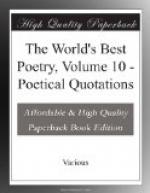Hope! of all ills that men endure,
The only cheap and universal cure!
* * * * *
Hope! thou first-fruits of happiness!
Thou gentle dawning of a bright success!
* * * * *
Brother of Faith! ’twixt whom and
thee
The joys of Heaven and Earth divided be!
For Hope. A. COWLEY.
Hope! thou nurse of young desire. Love in a Village, Act i. Sc. 1. L. BICKERSTAFF.
Hope, like a cordial, innocent though
strong,
Man’s heart at once inspirits and
serenes;
Nor makes him pay his wisdom for his joys.
Night Thoughts, Night VII. DR. E. YOUNG.
Hope, like the glimm’ring taper’s
light,
Adorns and cheers the way;
And still, as darker grows the night,
Emits a brighter ray.
The Captivity, Act ii. O. GOLDSMITH.
Thy wish was father, Harry, to that thought. King Henry IV., Pt. II. Act iv Sc. 4. SHAKESPEARE.
Cease, every joy, to glimmer on my mind,
But leave—oh! leave the light
of Hope behind!
The Pleasures of Hope, Pt. II. T.
CAMPBELL.
Hope springs eternal in the human breast:
Man never is, but always to be, blest:
The soul, uneasy and confined from home,
Rests and expatiates in a life to come.
Essay on Man, Epistle I. A. POPE.
The wretch condemned with life to
part,
Still, still on hope relies;
And every pang that rends the heart
Bids expectation rise.
The Captivity, Act ii. O. GOLDSMITH.
The miserable have no other medicine,
But only hope.
Measure for Measure, Act iii. Sc. 1.
SHAKESPEARE.
To
hope till hope creates
From its own wreck the thing it contemplates.
Prometheus. Act iv. P.B. SHELLEY.
HORSEMANSHIP.
I saw young Harry, with his beaver
on,
His cuisses on his thighs, gallantly armed,
Rise from the ground like feathered Mercury,
And vaulted with such ease into his seat,
As if an angel dropped down from the clouds,
To turn and wind a fiery Pegasus,
And witch the world with noble horsemanship.
King Henry IV., Pt. I. Act iv. Sc. 1.
SHAKESPEARE.
“Stand, Bayard, stand!” The
steed obeyed,
With arching neck and bended head,
And glancing eye, and quivering ear,
As if he loved his lord to hear.
No foot Fitz-James in stirrup staid.
No grasp upon the saddle laid,
But wreathed his left hand in the mane,
And lightly bounded from the plain,
Turned on the horse his armed heel,
And stirred his courage with the steel.
Bounded the fiery steed in air,
The rider sate erect and fair,
Then, like a bolt from steel cross-bow,
Forth launched, along the plain they go.
The Lady of the Lake, Canto V. SIR W.
SCOTT.




